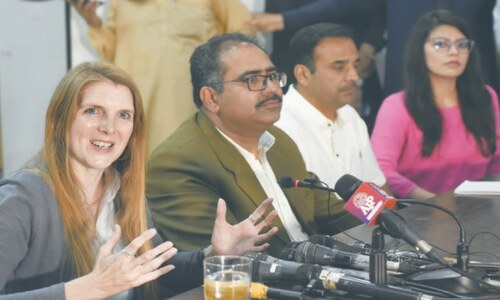ISLAMABAD, Dec 12: More liberal trade policies by India and Pakistan will not only benefit the region but also the two countries.
This was stated by speakers at a seminar’s session on: “Addressing NTBs (non-tariff barriers) in Indo-Pakistan trade: Implications for South Asia organised by Sustainable Development Policy Institute (SDPI) on Wednesday.
The session was part of three-day conference on the theme “Sustainable Development in South Asia: Shaping the Future”, which was chaired by Mr. Khurram Dastagir Khan, Member National Assembly.
Safdar Sohail, DG Trade Policy, Ministry of Commerce, while speaking on the occasion, said that idealistic and romantic narratives of religious and cultural homogeneity between the two countries were useful but not sufficient.
“If we want to reap the benefits of bilateral trade we need to synchronize policies, such as equalizing subsidies in export industries,” he added.
Ali Khizer, the representative of Business Recorder, said that both the countries had trade potential of $10 billion, whereas the actual trade between the two stood at only $2 billion.
He also said although removal of tariff barriers would harm local producers in the short run, the consumers would benefit immensely, especially in the services sector.
The panel also included Saad Rajput, research analyst at SDPI and Adnan who was representing Engineer Jabbar from Qaim Filters, Karachi. They highlighted the types of non tariff barriers present and the problems they are creating for the businessmen and investors of the two countries.
Dr. Pervez Tahir, former chief economist of Planning Commission, said that the economies of India and Pakistan differed in several aspects. “Trade like any other business requires facilitation in terms of infrastructure and opportunities,” he said.
In another session on: “Women Political Participation,” speakers welcomed greater representation of women in the national and provincial assemblies.
Interestingly, pro-women legislation was carried out not during the period of democracy, but during military regime of Pervez Musharraf, who allowed women to enter the legislative process through reserved seats and quotas, they said.
A law forced political parties to field female candidates that were more educated than their male counterparts.
“However, many of these women had allegiances to the vested interest and the privileged classes they represented, rather than the women’s movement at large,” said writer and activist Faryal Gauhar.
Despite this, Anis Haroon, Chairman of the National Commission on the Status of Women, was of the opinion that the Parliament consisted of not just an elite class of women, but men as well. Therefore, structural changes were required at every level of the political system to improve the quality of legislative representation, he added.
Better organisation at the grass roots levels, representation in central executive committees of political parties and entry into the workforce were noted as a way forward for female participation in politics.
Also contributed by Fatima Mujtaba














































Dear visitor, the comments section is undergoing an overhaul and will return soon.